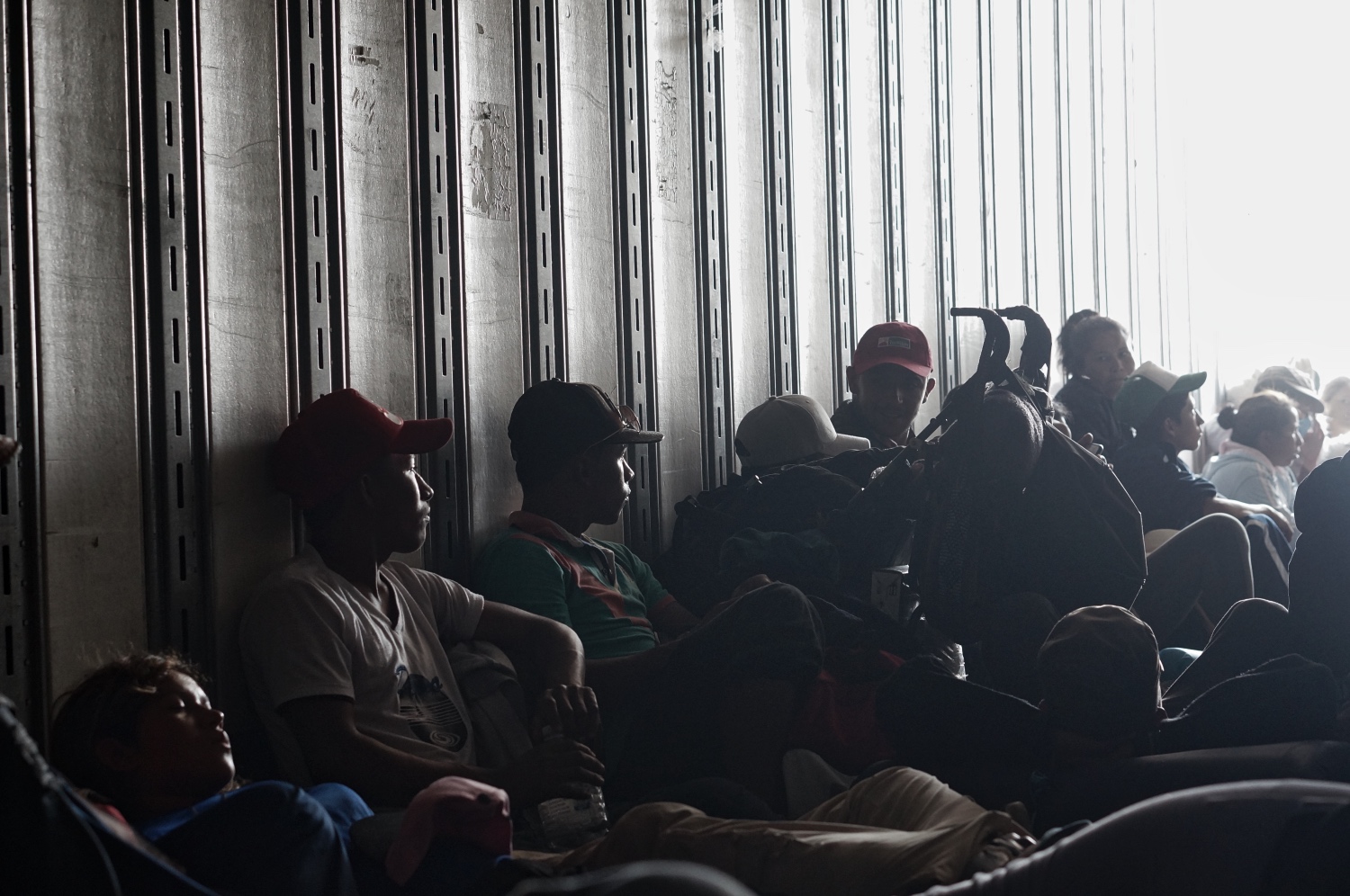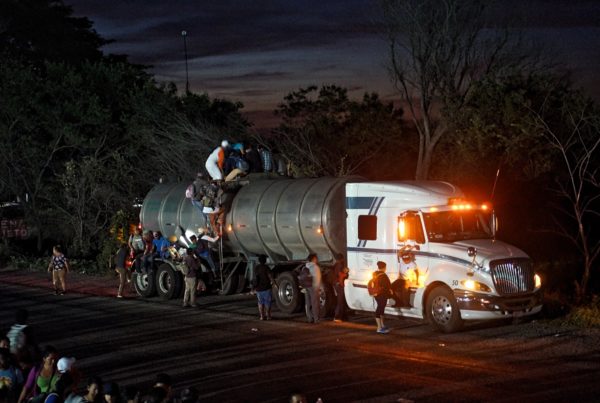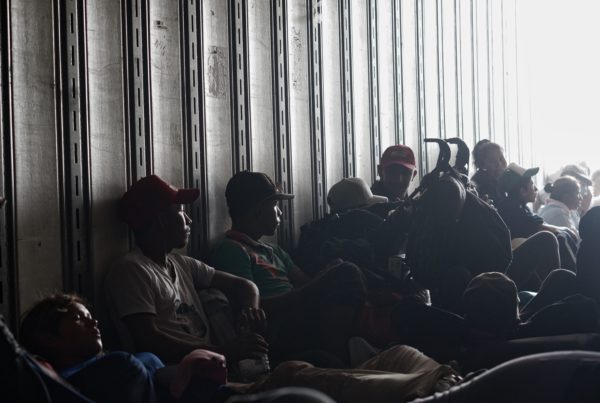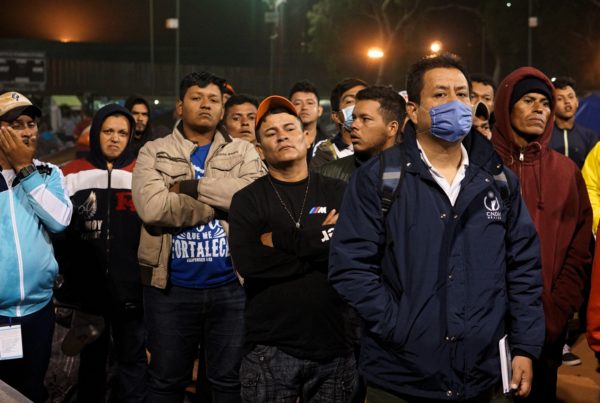After spending several days resting in Mexico City, the Exodus – as the migrants call the caravan – hosts a public assembly to decide the Exodus’ route north to the US border. The Exodus votes to travel the safer path along the west coast, through the states of Jalisco, Nayarit, Sinaloa and Sonora to Tijuana in Baja California. It’s believed that the shorter route through Tamaulipas state to Reynosa is more dangerous, although both routes will pass through territory where drug cartels operate. A departure time of 5am is set.
“Si se pudo,” the crowd chant.
Mexico City, which officially became a “Sanctuary City” in 2017, has been good to the migrants providing them with a wide range of services during their stay. Health services, social services, legal services; food, water, toilet and bathing facilities; donations of clothes, shoes and all sorts of other items that will help the migrants on their journeys. However, the sports ground in which they were being housed could only hold the thousands of migrants for so long.
The people want to leave. They need to leave. Movement is progress. It feels good to be advancing towards a goal. But what will they find at the Mexico-US border? Will they be allowed entry? Will there be violence? Nobody knows what to expect. The assembly reverberates with the chants of, “yes we can”. Regardless of the dangers, they are leaving. I wonder how these thousands of people will navigate their departure from a metropolis as big as Mexico City.
* * *
The City of Mexico opens the metro early to allow the migrants easier travel out of the city. Coughs echo around the empty metro stations and fill the metro carriages. Sickness has spread through the caravan of thousands. Living in close quarters, travelling in harsh conditions, with young children is fertile ground for epidemics. By the time the Exodus arrived in Mexico City, health services were inundated with serious cases. One child was transferred immediately to hospital suffering problems with his lungs.
I have joined a group of young people for this leg of their long journey. There is 23-year-old David from Honduras, 19-year-old Jenni and her 21-year-old brother Christian from Guatemala.
Jenni and Christian are from Morales Izabal, near the east coast of Guatemala and the border with Honduras. They have another brother and sister who stayed behind in Guatemala. Their mother works as a housewife and their father is a bricklayer. But their parents are also pastors at an evangelical Christian church.
Jenni believes her father is a well-respected figure in the community because of his generous work as a pastor.
“All the people love him,” she says.
When Jenni graduated from high school, she began working as a cleaner in a house in Guatemala City, 4 hours from her family home in Morales. Christian left school at 13 and began working in construction. Jenni doesn’t like working in the house, cooking and cleaning, She prefers to get up at 6 in the morning and go with her dad to work as a mason. While Christian worked for a living, before she left school, she helped her father build their local church. She likes the fact that people are surprised to see a working girl wiping sweat off her brow.
Jenni tells me Guatemala is dangerous. Where she lived in Morales there are many gangs. There is a plaza called “La Línea” where men spend their time drinking. A lot of these men are armed with guns, she tells me. They intimidate women and she says girls have been taken in cars and raped and killed.
According to Amnesty International, thousands of people continue to flee Guatemala to escape high levels of inequality, violence, impunity and corruption. Human Rights Watch reports that violence and extortion by powerful criminal organisations remain serious problems in Guatemala.
”Gang-related violence is an important factor prompting people, including unaccompanied youth, to leave the country.”
When I ask Christian why he left Guatemala he tells me he is “crime-free”. He says he left Guatemala for an adventure. When I remark that this is a dangerous way to adventure, he replies, “I like danger” and laughs. He say he likes guns, which makes me think he’ll settle just fine in America. His uncle gifted him his first gun when he was 15. When he was 17, he bought a 9mm. He once shot a man in the leg, although he says it was in self-defence. He says gun violence is normal in Guatemala and that he is used to fighting in the street. He is full of young male bravado. In the context of Guatemala this adds an element of violence and danger.
Christian was in his hammock when a friend of his told him about the caravan and encouraged him to join. Christian called Jenni the evening before he was leaving for the caravan to ask her if she wanted to come. She had less than 24 hours to decide if she would join him. Jenni’s father didn’t want her to travel in the caravan because he believed it would be too dangerous, but she left anyway. In their home town of Morales, they joined a group with coordinator. It took their group two days to find the caravan.
Jenni wants to live in the United States so she can work and help her parents. She doesn’t speak English, and she is unsure how she will learn if she has no money. Jenni and Christian have an aunt who lives in Virginia who will help them settle. Christian left behind his pregnant girlfriend in Guatemala. When he arrives in the US, he hopes to send money back to support her and his child.
David heard about the caravan while standing in line at the bank. Three thousand people had left San Pedro Sula and were walking to Guatemala. This coincided with the news that he would be let go from his work at a supermarket. His co-workers told him there would never be a safer, easier opportunity to reach the US than with the caravan. He left Honduras the next day and joined the caravan in Guatemala.
These young people – who usually have few, if any, opportunities to travel abroad – radiate hope and excitement. They dream of America, even if they don’t know what to expect on the other side of the border. I understand why they see this trip as an adventure but I wonder if they fully understand the risks of their journey.
* * *
Once we reach Cuatro Caminos metro station, the people of the Exodus begin walking to the highway. Our path takes us alongside busy roads and underneath overpasses. Blaring horns fill our ears. Pollution and smog is blown in our faces. But after weeks of walking the people of the Exodus are accustomed to this life. People on the road become people of the road. They are comfortable with trucks flying past their ears at 100km/h. When the pavement ends, we occupy a lane of the road.
We walk past the poorest outskirts of Mexico City: slum communities housed in tin sheds. A ute stops offering an empty tray. The people in the vicinity take their opportunity. Our slow march is interrupted by a mad rush of energy. People pile into the tray. The driver, worried that too many people will jump on, leaves before everyone is aboard and settled. A man hangs onto the back fearing for his life. I fall in head first. In the madness, Christian is left behind. He will have to catch up later.
The ride is spent squatting inside the tray or perched on the edge, rushing concrete one accident away. Personal space is abandoned. People squash into each other’s laps and are forced into embraces. There is a collective sense of responsibility to care for each other. Those inside the tray hold onto those on the edges of the tray. Rushing wind pushes my hair back and rejuvenates my tired eyes. Even squatting at awkward angles is better than endless walking. Any rest is welcome no matter how short, but every person in the tray is hoping the ride will go on forever.
When the ride ends, there is a dilemma. The phone Jennifer and Christian share is in her pocket. We have no way of contacting him. Should we wait for Christian or go on without him? To wait is agonising. But to be left to walk the road alone is worse. A bus stops in front of us offering a lift. It’s hard to give up. We trust in Christian’s ability to catch a ride and board the bus. We later see him flying past in the tray of a ute which justifies our decision not to wait for him.
We are still a long way from the highway and so people hitch lifts whenever there is opportunity. Often the lifts are short, so it takes four or five rides to reach the meeting point at the toll station at the turn-off to Tepotzotlán.
The public buses are free for the members of the Exodus. I don’t know if that’s a government directive, but I feel like it’s the generosity of the bus drivers. The people of the caravan clog public transport but none of the Mexicans in the buses complain. At one stop, three young men wearing polo shirts eye the dirty, tired occupants and opt for the next ride.
Jennifer’s jaw clenches. It’s a slap in the face for the people in the small bus.
“They think they are better than us,” she says.
The more adventurous young men climb on top of petrol tankers. These rides are the road’s version of La Bestia trains. The cheapest, quickest but most dangerous option to reach the United States. David knows an acquaintance on the journey who fell in the gap between the trailer and the cabin.
“His foot was completely destroyed,” David says.
I didn’t need that story to convince me to never try to ride a petrol tanker.
We reach the meeting point alternating between walking and hitching rides. Walking is exhausting. Your feet hurt. Your back hurts. After days on the road everything hurts. The sun increases in intensity throughout the day. Some people carry heavy bags; others carry heavy children. One man is in a wheelchair. I don’t know how he is managing. Once we pass something we can’t go back. It’s too far. Even if that tamale food stand is only 20 metres behind us. It’s a metaphor for their lives. Only look forward; never back.
The trip is made easier by Mexicans who have parked on the side of the road offering water and tortas. The generosity of the Mexicans is appreciated, but after weeks of homemade, squashed, roadside sandwiches, the members of the Exodus desire variety in their diet.
At the meeting point, we can eat and rest and use the toilet. Civil society groups of Mexico City have arranged for services to welcome the Exodus. Mexican families with their children offer bottles of water. People rest in the shade. The state police are lined up on the highway stopping trucks and requesting lifts for the people of the Exodus. Once a lift is arranged, people climb into storage containers. It’s a strange sight: state-sponsored “people smuggling”.
Jennifer, David and I join the long line for lifts. We return to the sun and bitumen. UV rays beat down on our heads and reflect upwards on to our bare legs. My skin burns. My back aches. My legs turn to lead. Waiting in the sun. Waiting in the sun. Waiting to climb into a dark storage container where children will vomit and babies cry. However, inside a truck is safer than on top of a petrol tanker.
The line inches forward. People collapse due to dehydration and exhaustion. I never knew it would take so much effort to move a centimetre on the map. This is one hour of one day in their month-long journey which will define their lives. The border seems forever away. Waiting, waiting, waiting. And then finally we climb inside the dark container of the truck.
People line up against the sides of the container first. Then they fill the middle. Everyone is sitting with their legs tucked up to their chests. People lie on top of each other. It’s a no smoking container but young men smoke anyway. They don’t care. It doesn’t take long for the relief of not standing to be replaced by a sore arse. There is rarely a comfortable ride in the Exodus. But it’s better than walking. The entire container full of people fall asleep to the rattle and bang of the metal container and the bumps in the road. Not even sudden breaks and screeching tyres wake them.
I look at one couple, their heads resting on top of each other. There is something quite romantic about their journey: risking it all for a better life.
The back door of the container is left open for air, but it also allows us to see green fields rush past. From the inside of the truck it’s impossible to know where we are going. Who knows if we are being kidnapped by narcotraficantes. This is not an unsubstantiated fear. This is a danger. Two trucks and 100 people went missing in the state of Puebla just one week earlier.
When we arrive in Queretaro, the Exodus is hosted in Corregidora football stadium. The people are not allowed onto the football ground or into the stands. Instead they camp in a ring around the outside of the seated area of the stadium but still protected by walls and gates and police.
After a hard day of travel people prepare for the evening. As people enter the stadium they are handed thick sleeping mats for free, although there is not enough for everyone. Many people are too tired to care where they settle. They slump to the ground and fall asleep immediately. Others are tactical with their sleeping arrangements. They want privacy or cover. They may have to think of children.
Some set up near the power-points so they can control charging of electronics. Some charge for charge; others offer it for free. The power board is a modern campfire, where people gather and socialise and tell stories. While charging my phone at a power board, I notice a woman and her child playing fondly inside their tent. I listen to a group talk about whether they like marijuana or not. One man says he doesn’t like it because he gets too stoned. It strikes me as the kind of conversation a group of young people in Australia would have. I overhear a man singing “Guadalajara, Guadalajara”, a mariachi song made famous in English-speaking countries by Elvis Presley. The city of Guadalajara is one of the next destinations on the route north. When I lived there 8 years ago, we used to sing those same lyrics repetitively.
At the toilets, men are washing at showers and by the tap. A group of women too impatient to wait in the women’s line join the men. Wolf whistles reverberate around the toilet block. After spending almost two weeks with the Exodus I have noticed, at times, some strained sexuality in the camp. Young men stare at young women. Women call out “papasito” to men. When music is turned on crowds of people start whistling, dancing, gyrating. The members of the Exodus have been living amongst each other for weeks on end. There is no separation. People are forced to constantly interact. There is little opportunity for privacy. In this environment, attention can turn into harassment and can be dangerous.
That evening the members of the Exodus vote to leave for Irapuato the next morning at 5am. This is how the Exodus moves. Forwards, forwards, never backwards. Feet are blistered. Backs are strained. Everyone is tired and sick, but the goal is clear in their minds. The sooner they reach the militarised border of the United States, the sooner they can learn their fate. Will it be liberty, opportunity, and freedom? Or a return to poverty, crime, corruption, and violence?



